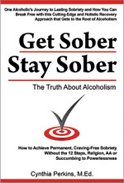Caffeine Addiction, Alcohol and Drugs
In our quest for craving-free and life-long sobriety from any addiction, caffeine is another substance that has to be eliminated, because it also affects neurotransmitters in the brain in a similar manner as alcohol and hard drugs, which often results in cravings for the substance of choice and relapse.
First and foremost, when you consume caffeine in any form, it stimulates the liver to dump larges doses of glycogen (sugar) reserves into the bloodstream. This results in a sugar high, and then insulin is released to control the blood sugar levels and the blood sugar drops very rapidly to below-normal levels and symptoms such as depression, anxiety, irritability, fatigue, and then cravings for sugar, alcohol or your substance of choice may appear.
As time goes on, insulin receptors become resistant from the high levels of sugar, and a whole cascade of effects like fat storage, inflammation, hyperinsulinism, cravings for sugar, carbs, alcohol, etc. occur. So, essentially, it's like you are eating sugar when you drink caffeine; and as we have established previously on this site, sugar consumption is public enemy #1 when you are tying to recover from alcoholism or any other addiction, because of the numerous ways it impacts brain chemistry and the endocrine system.
This means that caffeine is also a major contributing factor to hypoglycemia, as it makes it impossible to stabilize blood sugar. Keeping the blood sugar stable is a priority for eliminating cravings and overcoming addiction because of its powerful impact on the brain and the autonomic nervous system.
Additionally, all this releasing of sugar will also feed Candida yeast, that so often occurs in the addicted population, and interfere in any efforts to eradicate its overgrowth, which may result in cravings for sugar, carbohydrates, alcohol or drugs. It is simply not possible to reduce yeast overgrowth if caffeine consumption continues.
Caffeine is an Addictive Stimulant Drug
Furthermore, caffeine is a stimulant drug that has serious negative effects on our central nervous system, endocrine system and cardiovascular system. It is found in a variety of plants, and in nature it serves as a natural pesticide by paralyzing insects that attempt to eat it. It is one of the most widely used and socially acceptable mind-altering substances in society and its effects on the body and brain are similar to many major drugs like amphetamines and cocaine. Many alcohol and drug addicted individuals replace their drug of choice with caffeine addiction.
Like other addictions, caffeine withdrawal is now listed as a mental disorder in the DSM5 Diagnostic and Statistic Manual of Mental Disorders. I would disagree that it is a mental disorder, but I mention this to demonstrate that it is considered by the mental health world to be a legitimate condition.
A study published in the Journal of Caffeine Research in 2013 coauthored by Laura Juliano, Ph.D., a psychology professor at American University in Washington, D.C, "indicates that more people are dependent on caffeine to the point that they suffer withdrawal symptoms and are unable to reduce caffeine consumption even if they have another condition that may be impacted by caffeine—such as pregnancy, a heart condition, or a bleeding disorder. The negative effects of caffeine are often not recognized as such because it is a socially acceptable and widely consumed drug that is well integrated into our customs and routines, There is misconception among professionals and lay people alike that caffeine is not difficult to give up. However, in population-based studies, more than 50 percent of regular caffeine consumers report that they have had difficulty quitting or reducing caffeine use, said Juliano.”
According to NIDA (National Institute on Drug Abuse) "chronic caffeine use produces greater tolerance in adolescents compared with adults, suggesting that caffeine may cause greater brain changes in young people. Caffeine consumption is also known to be correlated with increased risk for illicit drug use and substance use disorders. Caffeine use by adolescents may prime the still developing brain for later use of other illicit drugs.
In the brain, there is a chemical that acts as a neurotransmitter, called adenosine. It is responsible for making you sleepy. The caffeine molecule looks very similar to adenosine; so when you drink caffeine, it tricks the brain into taking the caffeine molecule instead of the adenosine molecule, and this prevents you from getting tired. It provides you with a false sense of alertness and energy.
Just like any other addictive drug, after chronic consumption of caffeine, tolerance develops. The brain adapts by modifying its receptors and over a short period of time more and more caffeine is needed to achieve the same results. The more you consume caffeine, the more you need. Pretty soon you can’t function or feel normal unless you consume caffeine.
Consumption of caffeine also results in an increase in the release of a variety of neurotransmitters like norepinephrine, glutamate and, yes, the all-important dopamine, which results in the mild euphoria, improved mood and clarity in thinking often experienced by caffeine drinkers. Its impact on dopamine is similar to that of amphetamines, which means it leads to depletion of dopamine and then dependence on caffeine to fulfill the duties of the missing dopamine, and it decreases production of serotonin. Caffeine also interferes with GABA and prevents it from performing its functions, like stress management, impulse control and mood control.
Additionally, caffeine triggers a flood of acetylcholine into the brain. This is what makes you feel more alert, focused and energized. Acetylcholine is our primary neurotransmitter needed to make the brain, nerves and muscles work, and has a direct impact on not only our mood, but memory as well. If acetylcholine is not produced or functioning properly, then all other neurotransmitters will be impacted. It is also the neurotransmitter the autonomic nervous system uses for all its functions. An excessive amount of acetylcholine is associated with depression and anxiety, while not enough acetylcholine is associated with Alzheimer’s and dementia.
Acetylcholine also regulates a variety of basic functions like mood, attention, arousal, sleep, intelligence, movement and stability. It is the neurotransmitter that is responsible for quick thinking and makes your mind sharp and clear. Like all other neurotransmitters, you need a constant supply of acetylcholine to keep your brain working.
Not enough acetylcholine and your brain feels cloudy, it’s difficult to absorb new information, and remember details, you feel tired, distracted, irritable, and may have difficulty falling asleep at night or maintaining your equilibrium.
When the brain is flooded with excessive levels of a neurotransmitter over and over, this leads to tolerance and depletion. Then there is not enough acetylcholine available to perform all its vital functions, so you feel drained and burnt out and become trapped in the vicious cycle of craving more and more caffeine to replace the acetylcholine you are missing. The more caffeine you consume, the more depleted acetylcholine becomes and the more intense your cravings.
Dr. Al Sears explains that when acetylcholine is not available, this sets the brain off on a frantic search to find some, and it will extract it from your brain cell membranes. Put more simply, your brain actually begins to destroy itself – this is called auto-cannibalism, because the body is destroying one part of itself to provide for another.
The auto-cannibalism will work as a short-term solution; providing your brain with the acetylcholine it needs to perform its functions. However, in the long run, the problem gets even worse, because this will impair your neurons’ ability to fire as efficiently as they should, thus impairing brain function even more and resulting in more cravings.
Caffeine increases kynurenate, which is a neurotoxin when present in excess. Normally, tryptophan is converted into serotonin, but some substances encourage tryptophan to convert into kynurenate instead. Ccaffeine consumption may lead to excessive levels of kynurenate.
If your favorite source of caffeine is coffee, coffee (including decaf) also contains a substance known as cafestol, which is a potent morphine-like compound, affecting the brain in a similar manner as other opiates. Coffee is also high in mold toxins, increases histamine levels, and causes inflammation in the gut, all of which encourage yeast overgrowth, degrade the health of the gut further, and may contribute to food sensitivities and autoimmune disorders.
Caffeine Triggers the Stress
Response System
Caffeine also elevates our stress hormones. It triggers the body to release adrenalin, also known as epinephrine, norepinephrine and cortisol, the hormones involved in our stress response system, also known as the fight-or-flight response. Stress hormones provide us with the extra physical and mental stamina, vigor and attentiveness that are needed to deal with a dangerous, threatening or emergency situation and then they recede once the stressful event is over. However, in this situation, no real life-threating situation exists, and as long as caffeine consumption is continued, then the stress hormones never recede. Thus, the body remains in a constant state of stress.
When we are under stress, then we have a very high demand for neurotransmitters to regulate the system, which means the stress from the caffeine will continually drain them out and keep the autonomic nervous system in an imbalanced state. All of which, can lead to cravings for alcohol and addictive substances of all kinds in an unconscious attempt to restore balance.
Additionally, when we are under stress our ability to regulate our impulse control, think things through and access new coping skills we have learned are impaired, which can result in falling back into old dysfunctional ways of coping with stress, which means you reach for alcohol or your drug of choice for a quick fix.
The primary role of adenosine, the neurotransmitter we mentioned previously, is to dampen or slow down firing of neurons. In Caffeine Blues, nutritional biochemist Stephen Cherniske, explains that when you consume caffeine, it blocks adenosine receptors (also found in the gastrointestinal tract, kidneys, cardiovascular system and respiratory system) so that adenosine is not able to do its job. This results in continuous and uncontrolled firing of neurons, which results in a feeling of alertness experienced with caffeine. This creates an emergency situation which triggers the classic stress response system, "affecting virtually every cell in the body.". "A single 250 milligram dose of caffeine has been shown to increase levels of the stress hormone epinephrine by more than 200 percent." An eight ounce cup of coffee may contain anywhere from 95 to 200 mg of caffeine.
In 60 minutes or so after consumption of caffeine, the stress hormones begin to recede, which prompts feelings of fatigue, hunger and crankiness, so you go after more caffeine. This vicious cycle subjects the adrenal glands, to excessive wear and tear, which over time can result in adrenal fatigue. The adrenal glands can no longer function adequately, which leads to a variety of problems like hypoglycemia, fatigue, irritability, weight gain, insomnia and inability to handle stress, all of which can then lead back to more cravings for caffeine, carbs, sugar, alcohol, nicotine, or drugs. As you can see addiction and stress are a bad combination, and a situation that you want to minimize at all times.
All the aforementioned issues have a destructive impact on the sleep cycle. You’ll not be able to sleep or, when you do, it won’t be deep and healing. Adequate sleep is crucial for overall good health and proper functioning of the neurotransmitters. Insufficient levels of sleep don't permit neurotransmitters any down time to rest, which causes receptors to lose sensitivity to the neurotransmitters, thereby making the neurotransmitter incapable of performing its actions adequately.
There is disruption in communication between neurons and neurotransmitters, and less serotonin, dopamine, etc. This cause and effect is illustrated very cleary in the impaired brain function, moodiness and irritability that we all exhibit if we go for too long without sleep. Lack of sleep will also increase your stress hormones, increasing the need for neurotransmitters, and increase your blood glucose, which means insulin will be released.
Additionally, lack of sleep increases the hormone ghrelin and decreases the hormone leptin. Ghrelin is the hormone that tells you when you’re hungry and leptin tells you when you’re full. If you have too much ghrelin and not enough leptin, then you will never feel like you have eaten enough, and will have cravings for sugar and carbs, which can then lead to cravings for alcohol and drugs.
Caffeine also increases heart rate and blood pressure and can contribute to or exacerbate, high blood pressure and heart disease, as well as depression, obesity or unwanted weight gain, anxiety disorders, pre-menstrual syndrome, insulin resistance, type 2 diabetes, headaches, hormone imbalance, nervousness, and many other psychiatric or medical conditions.
Caffeine Addiction Perpetuates Alcohol
and Drug Addiction
What we want to pay special attention to here is that, once again, we have a substance that affects the important neurotransmitters in the brain, dopamine, serotonin, GABA, endorphins, and acetylcholine, in the same manner as drugs and alcohol. Remember, in order to overcome addiction, the neurotransmitters must be stabilized. Caffeine makes it impossible to stabilize neurotransmitters. It keeps them on a roller-coaster ride and leads to more cravings for addictive substances, as well as symptoms like depression and anxiety and you’ll feel driven to self-medicate with more of your drug of choice.
Consumption of caffeine keeps the cycle of addiction active, even though the drug of choice has been removed. When the recovering alcoholic or drug addict drinks caffeine, the physiological process of addiction is still in play on a lower scale. In the case of the sugar addict, it results in cravings for sugar or carbohydrates. In the alcoholic or drug addict, caffeine doesn’t give the same intensity of a boost to the neurotransmitters as alcohol or drugs; so it often leads to cravings for alcohol or drugs, and results in relapse. If you remove caffeine, as well as nicotine and sugar, from your life, then you can eliminate cravings for alcohol or your substance of choice and significantly increase your chances of remaining clean and sober.
Furthermore, caffeine interferes in absorption of a variety of nutrients like iron, calcium, vitamin D, zinc, potassium, and many of the B vitamins like B1, inositol and biotin, many of which are needed in the production of neurotransmitters and a healthy brain. So if you are taking a multi-vitamin with your morning cup of coffee, it isn't doing you much good.
In my work as a sobriety coach, I have found that caffeine addiction is a major downfall for many people and a frequent cause of relapse. They will make great progress in staying sober by giving up sugar, eating properly, taking their nutrients and not smoking, but then they have a cup of coffee and they are off and running. It is not uncommon for my caffeine addicted clients to suffer withdrawal that is as serious and intense as withdrawal from hard drugs.
It is one of the most difficult hurdles for people to overcome because of society’s acceptance of caffeine and how deeply engrained it is in many social activities. Most people fail to see how harmful it is and encourage the caffeine addict to continue drinking it. As there is with sugar, a great deal of reprogramming the mind is required to be successful in giving it up.
Caffeine has been reported to be “the most widely used drug in the world. In the United States, more than 90% of adults use it regularly, and, among them, average consumption is more than 200 mg of caffeine per day — more caffeine than is contained in two 6-ounce cups of coffee or five 12-ounce cans of soft drinks." In 2013 coffee was a "$30 billion-a-year national industry."
All caffeine, including coffee, tea, green tea, chocolate, cocoa, raw cacao, soda pop or soft drinks, energy drinks etc., should be avoided. This includes decaffeineated coffee as well, because decaf still contains a small amount of caffeine; and any amount will perpetuate the cycle of addiction.
References
Cynthia Perkins, M.Ed., Get Sober Stay Sober: The Truth About Alcoholism.
Dr. Al Sears, One Cup Away From Destroying Your Brain, June 28, 2012, Email Newsletter.
Cherniske, Stephen, Caffeine Blues: Wake Up to the Hidden Dangers of Americas #1 Drug. Warner Books (1998)
L. S. Guzzo, et. al. "Cafestol, a coffee-specific diterpene, induces peripheral antinociception mediated by endogenous opioid peptides." Clin Exp Pharmacol Physiol. 2012 39.5 https://www.ncbi.nlm.nih.gov/pubmed/22332877
J.H. Boublik. Coffee contains potent opiate receptor binding activity." Nature. 1983 Jan 20.301 https://www.ncbi.nlm.nih.gov/pubmed/6296693
Veracity, Dani. “The Hidden Dangers of Caffeine: How Coffee Causes Exhaustion, Fatigue and Addiction.” Natural News.com, 2005. http://www.naturalnews.com/012352.html
Jasvinder Chawla, et al. “Neurologic Effects of Caffeine.”Medscape. November 11, 2015. http://emedicine.medscape.com/article/1182710-overview
Sandra Blakeslee..“Yes, People are Right. Caffeine is Addictive.” October 5, 1994
http://www.nytimes.com/1994/10/05/us/yes-people-are-right-caffeine-is-addictive.html
National Institute on Drug Abuse (NIDA). “Adolescent Caffeine Use and Cocaine Sensitivity.”
https://www.drugabuse.gov/news-events/latest-science/adolescent-caffeine-use-cocaine-sensitivity
Joseph Stromberg. “This is How Your Brain Becomes Addicted to Caffeine.” Smithsonian.com August 9, 2013.
http://www.smithsonianmag.com/science-nature/this-is-how-your-brain-becomes-addicted-to-caffeine-26861037/?no-ist
Steven E. Meredith, et al. “Caffeine Use Disorder: A Comprehensive Review and Research Agenda.” Journal of Caffeine Research 3.3 (2013)
https://www.ncbi.nlm.nih.gov/pmc/articles/PMC3777290/
Maggie Barrett. “Caffeine Use Disorder Needs More Attention.”
American University. Washingtong D.C. http://www.american.edu/media/news/20140203_Caffeine-Use-Disorder-Needs-Attention.cfm
National Institute on Drug Abuse (NIDA). “Adolescent Caffeine Use and Cocaine Sensitivity.” https://www.drugabuse.gov/news-events/latest-science/adolescent-caffeine-use-cocaine-sensitivity
Mayo Clinic Staff. “Caffeine content for coffee, tea, soda and more.” Mayo Clinic. http://www.mayoclinic.org/healthy-lifestyle/nutrition-and-healthy-eating/in-depth/caffeine/art-20049372
Steven E. Meredith, et al. “Caffeine Use Disorder: A Comprehensive Review and Research Agenda.” Journal of Caffeine Research 3.3 (2013) https://www.ncbi.nlm.nih.gov/pmc/articles/PMC3777290/
Karen Fernau. “Coffee Grinds Fuel the Nation.” USA Today April 9, 2013. http://www.usatoday.com/story/money/business/2013/04/09/coffee-mania/2069335/





